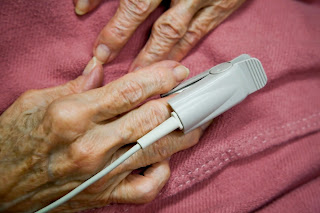Prior to the 1980s, when pulse oximetry started being used in hospital operating rooms, blood oxygenation of patients was determined through arterial blood gas tests which took several minutes to accomplish. At the time, medical journals estimated that between 2,000-10,000 patients died per year as a result of hypoxemia (low blood oxygen) that went undetected in the O.R.
With the introduction of pulse oximetry, continuous blood oxygen levels could be monitored, greatly increasing patient safety. By 1987, the use of pulse oximeters in the O.R. became the standard when general anesthetic was used. Soon, the use of oximeters spread to recovery rooms, intensive care units and neonatal units, where proper oxygen levels are of critical importance to newborn patients.
The Growing In-Home Use of Pulse Oximetry
With the ease of operation and inexpensive cost of today's pulse oximeters, they're now prescribed for in-home use by doctors for monitoring the oxygen saturation level of patients suffering from a variety of conditions. A recent research report (2011) estimated that the annual market in the U.S. alone for pulse oximetry equipment (units and sensors) was more than $700 million. It has also been found that more than half of the medical equipment manufacturers in China, that export internationally, are involved in the manufacturing of pulse oximeters.
Top Medical Reasons You Need a Pulse Oximeter
- COPD, or Chronic Obstructive Pulmonary Disease, is a lung condition that's characterized by poor airflow. Major symptoms include a chronic cough and shortness of breath. While there is no known cure, treatment includes the administration of supplemental oxygen. Use of a pulse oximeter will allow a patient to monitor their level of oxygen saturation and to know when more or less supplemental oxygen is needed.
- Shortness of breath is a symptom of a number of medical conditions that may require the administration of supplemental oxygen and require the use of a pulse oximeter to monitor blood oxygen levels. These may include emphysema, chronic bronchitis and mesothelioma.
- Sleep Apnea is a sleep disorder in which the sufferer experiences pauses in breathing while asleep. These pauses can last anywhere between a few seconds to several minutes. During these pauses, sufficient amounts of oxygen are not brought into the lungs and high levels of carbon dioxide build up. Treatment for this condition may include the administration of pressurized air into the throat. A pulse oximeter is often utilized during sleep studies to determine if an individual is a victim of apnea.
- Patients suffering from pulmonary or cardiac diseases will often have their blood oxygenation negatively affected and may be required to have supplemental oxygen available if needed. In this case, having a pulse oximeter to have an indicator of blood oxygen levels is essential.
- Respiratory depression may be induced by use of sedatives or by those suffering from shock or cranial pressure. Monitoring blood oxygen levels may be important in these instances, necessitating in-home use of a pulse oximeter.
If you are suffering from any of these conditions, visit Concord Health Supply for your health care and oximetry needs.

No comments:
Post a Comment